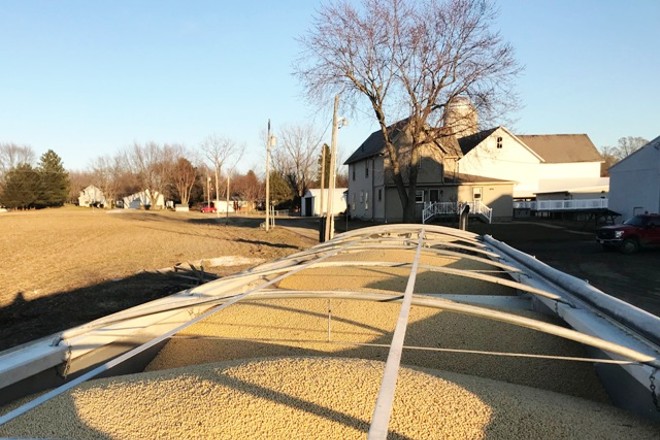Chinese Soybean Tariff Spells Trouble for Ohio Farmers
By Mary Kuhlman, Ohio News Connection on Tue, Mar 12, 2019 at 8:42 am
[
{
"name": "Ad - NativeInline - Injected",
"component": "38482495",
"insertPoint": "3",
"requiredCountToDisplay": "5"
},{
"name": "Real 1 Player (r2) - Inline",
"component": "38482494",
"insertPoint": "2/3",
"requiredCountToDisplay": "9"
}
]
Nearly a year after the start of a dramatic trade war between the U.S. and China, high tariffs are preventing Ohio farmers from selling many of their soybean crops, costing farmers their largest export to China.
"Just in our industry, that one commodity has cost farmers millions of dollars on lost income and revenue," says Jack Irvin, a federal lobbyist with the Ohio Farm Bureau Federation.
The trade war started last March with President Donald Trump's introduction of steel tariffs, which he enacted with the intent of boosting the U.S. steel industry.
Chinese trade officials responded with a 25 percent tariff of their own on U.S. soybeans.
The tariff came as a shock to many farmers across the nation after 25 years of China's increased purchasing of soybeans. Every third row of soybeans was going there, says Ben Klick, an Ohio farmer and member of the Ohio Corn and Wheat Growers Association.
China has consistently relied on large amounts of U.S. soybeans to supply its pork economy. Soybeans are commonly used in feed for pigs throughout the country.
Klick says he was lucky to get his soybeans to market before the tariffs were enacted. He says he still has other products he can sell, but unfortunately, some other farmers didn't share in his luck.
Those who didn't get their yields out in time have kept most of their soybeans in storage, waiting for the tariffs to be dropped.
Now, China has moved to buying soybeans from Argentina and Brazil, countries with growing agricultural sectors. Klick says the vast amount of soybeans imported to China from these two countries could boost them into top spots.
Klick adds he is worried because Argentina and Brazil can already plant crops more often than the U.S. and, with a few infrastructural improvements, they could take most of the market share.
"I know this trade war will end eventually, but, when it does, the issue that I see is will we, as farmers, be able to regain our access to China's soybean import market," Klick says.
This would prove a drastic setback, as Ohio farmers would lose a third of their buyers if they can't win Chinese buyers back.
As farmers are getting ready to plant the next crop of soybeans, they don't know if they can expect any trade with China, since the two countries have reached no trade deal.
Data from the U.S. Department of Agriculture show soybean exports are down more than 90 percent under the trade dispute and U.S. farmers lost nearly $8 billion in the past year.
Steel production in the U.S. rose about 5 percent last year after tariffs on foreign steel were increased 25 percent.
While the tariffs have helped the U.S. steel industry grow, their impact reaches beyond just farmers. Irvin points out agriculture creates $120 billion in economic activity and 12 percent of jobs are related to the industry.
The average U.S. citizen will see price increases on all kinds of products until a deal is reached.
"Some people can come out ahead if you're protected, but it spills over in lots of other ways to lots of other firms and lots of other people," says C. Lockwood Reynolds, an economics professor at Kent State.
If a trade deal isn't resolved between leaders by early March, farmers will likely see even higher tariffs introduced.
"They both [U.S. and China] want what they want, and they look out for their people and they're not going to give to each other," Klick says.
Chinese buyers want U.S. soybeans, Klick notes, but won't buy them until the tariffs are removed. Klick says he believes in the president and that's why he voted for him, but says it's unfortunate to be on the losing end of the deal.
And Klick notes there is only a matter of time before the president shifts his focus back to re-election in 2020 and trade is not at the top of his priorities anymore.
"I know there's a greater good behind what we call this 'market strategy' but if I had to sit down with some Chinese grain buyers right now, I would ensure that if things get back to what I would consider normal that we would be ready with open arms to work side by side with them and get some great quality soybeans back into their country," he says. "A very wise man once told my grandfather one time 'You don't fight with another country over food, they don't forget stuff like that.'"
The Agriculture Department approved about $12 billion to assist farmers impacted by tariffs.
Tags:
SCENE Supporters make it possible to tell the Cleveland stories you won’t find elsewhere.
Become a supporter today.
Scroll to read more Cleveland News articles
Newsletters
Join Cleveland Scene Newsletters
Subscribe now to get the latest news delivered right to your inbox.













